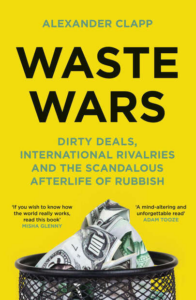This week’s selected media, March 2, 2025: Waste Wars and Ishmael
This week I finished:

Waste Wars, by Alexander Clapp: I can’t recommend this book enough. I came across it by reading an Op-Ed piece by the author in the New York Times: The Story You’ve Been Told About Recycling Is a Lie. That piece begins:
In the closing years of the Cold War, something strange started to happen.
Much of the West’s trash stopped heading to the nearest landfill and instead started crossing national borders and traversing oceans. The stuff people tossed away and probably never thought about again — dirty yogurt cups, old Coke bottles — became some of the most redistributed objects on the planet, typically winding up thousands of miles away. It was a bewildering process, one that began with the export of toxic industrial waste. By the late 1980s, thousands of tons of hazardous chemicals had left the United States and Europe for the ravines of Africa, the beaches of the Caribbean and the swamps of Latin America.
In return for this cascade of toxins, developing countries were offered large sums of cash or promised hospitals and schools. The result everywhere was much the same. Many countries that had broken from Western imperialism in the 1960s found that they were being turned into graveyards for Western industrialization in the 1980s, an injustice that Daniel arap Moi, then the president of Kenya, referred to as “garbage imperialism.” Outraged, dozens of developing nations banded together to end waste export. The resulting treaty — the Basel Convention, entered into force in 1992 and ratified by nearly every nation in the world but not the United States — made it illegal to export toxic waste from developed to developing countries.
If only the story had ended there. Despite that legislative success, the poorer nations of the world have never stopped being receptacles for the West’s ever-proliferating rubbish.
I thought I knew a lot about waste. This book takes it to another level. If you’ve wanted to reduce your waste and don’t want to rely on willpower, Waste Wars will fill you with revulsion, indignation, and I hope compassion for the people on the receiving end of our pollution.
I avoided plastic already. Now I’ll avoid it more.
He points out several times what I’ve found too: the problem isn’t handling the waste after it’s created. It’s producing too much. That’s a cultural problem. Solving it means leadership, not technology or market incentives, though those stopgaps can play a role.
Read Waste Wars.

Ishmael, by Daniel Quinn: I remember my stepfather recommending this book, saying it meant a lot to him. He lent me his copy and I read it, but finishing it again, I recalled reading many details, but forgot most of it.
I think it has interesting ideas about different cultures: ours and indigenous. I call ours in my book “PAID” culture, where the acronym refers to our culture’s dominating traits (if you don’t mind my reordering them): polluting, depleting, imperialist, addicting. I call others “Sustainable Free Abundant,” and note not all indigenous are Sustainable Free and Abundant, so not exactly identical as indigenous. He calls ours “takers” and others “leavers.”
Still, some big problems. First, he doesn’t show why the new culture formed. Just some people became takers. Why? Why then? Why not before? What made them different? Are they just bad or evil?
Since Quinn only describes behavior but not motivation, it seems we have to conclude the takers were different in some way. In this regard he’s like all the anti-racist authors who say there’s no such thing as race, but white people do racist things.
Without motivation, I see the book as distracting from what led to the changes and that motivation is the point. Misunderstand that part and all you can do is describe phenomenology but not cause. If you want to change the results, you have to change the causes, which he doesn’t help.
Another problem: the core of the book is just Quinn describing his philosophy. If the cover announces it’s a novel, make it a novel. It reads like The Fountainhead or Atlas Shrugged: some fantasy by the author that doesn’t connect with my understanding of reality or add to the story (a gorilla in this book, how society evolves in Ayn Rand’s) as a premise for the author to deliver a polemic.
I would have preferred Quinn just write the polemic without the gorilla and not stop his analysis at takers just started taking. My book describes why and how PAID culture formed. The why and how matter. My next book will go into more depth.
Read my weekly newsletter

On initiative, leadership, the environment, and burpees
Pingback: My favorite books and movies of 2025 » Joshua Spodek